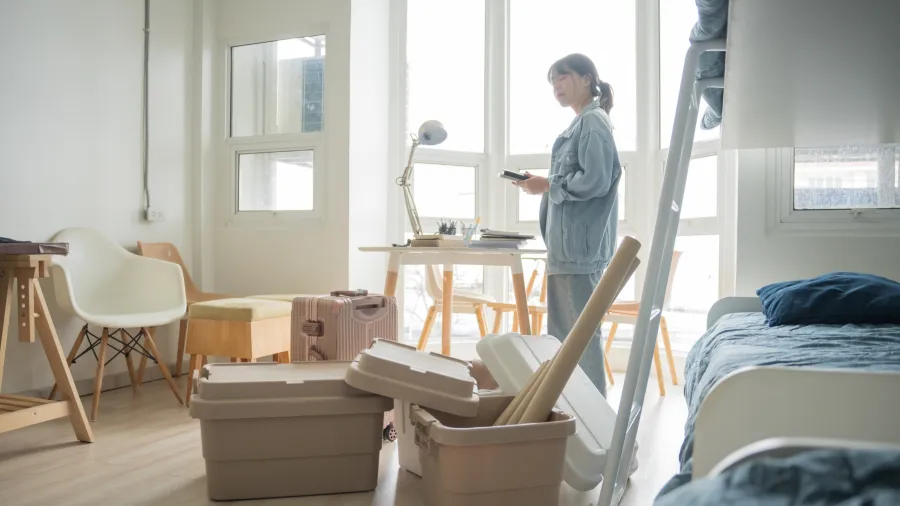
College homes, industrial sites a bright spot in Hong Kong property slump
Converted hotels and industrial estates offer investors a lifeline.
Investors are bottom-fishing for properties with stable returns such as hotels that can be converted into student houses, and industrial sites that can be repurposed into cold storage or data centres amidst Hong Kong’s property slump.
They are also targeting distressed homes and retail spaces, analysts said, after the city’s big landlords and property developers faced the steepest real estate downturn in two decades last year.
Hong Kong’s commercial real estate deals dropped by 4.6% to $5.3b in the second quarter from three months earlier, according to Colliers. It expects the full-year figure at $30b, a 19% yearly decline.
Meanwhile, CBRE's Valuation & Advisory Services team expects home prices to continue falling in the second half, and a 5-10% decline for the full year, even after the government scrapped property curbs in February. Rentals, on the other hand, are expected to grow by another 6% this year, spurred by the growing class of foreign university students and married couples, it said.
Hotels repurposed for student accommodations are emerging as the top choice for investors, as the influx of mostly mainland Chinese students leads to higher rents. For the 2024 academic year, which started in September, the government has doubled the non-local student quota of publicly funded, post-secondary institutions to 40% of admissions.
“The shortfall of approximately 120,000 student beds highlights the potential for further expansion and investment in the student accommodation sector,” Kathy Lee, head of Research at Colliers Hong Kong, told Hong Kong Business.
In February, Ovolo Group sold The Sheung Wan, a 56-room boutique hotel in Hong Kong’s Sheung Wan district, for US$41m ($319m) to Dash Living & PGIM Real Estate. The hotel was later converted into a co-living development called Dash Living on Queen's.
In the first quarter, Hong Kong Metropolitan University bought Urbanwood Hotel in Hung Hom for student housing. Now called MU88, the 16-storey tower has 255 rooms and can house 480 people. Operations started in August.
In September, Centaline Group, one of Hong Kong's largest property agents, entered the student housing market by acquiring the 63-room Popway Hotel in Tsim Sha Tsui, near Polytechnic University. It intends to convert it into a 150-bed student accommodation facility.
CBRE estimates that by 2027, non-local post-secondary students in Hong Kong will have exceeded 100,000. Between now and 2027, there will be 30,751 new non-local students, but only 8,558 hostel beds will be available, or a shortfall of 22,193 beds, it said in a report.
‘More resilient income’
Martin Wong, head of Research and Consultancy for Greater China at Knight Frank, noted that three- and four-star hotels are struggling because locals don’t go there for dinner or a buffet. Tourists, on the other hand, prefer high-end hotels.
“Investors are taking this opportunity to buy some of these hotels and convert them into other living sectors like student accommodation or co-living [spaces] because on a per square foot basis, the return is kind of higher compared with the original hotel setup,” he added..
Student accommodations are more than 90% occupied, with stabilised net operating income margins of 70-75%, depending on scale, according to Colliers.
“Compared with traditional hotel assets, student accommodation offers a more resilient income stream and requires lower operating costs, including reduced staff and marketing expenses,” it said in a report.
“With the right product, investors can achieve significant rental premiums and accretive rental yields. Units smaller than 100 sq ft saw a compound annual growth rate (CAGR) of 7.2% over the last five years,” it added.
Investors seeking higher yields are also increasingly turning to the industrial segment for assets that can be converted into cold storage or data centres, said Marcos Chan, executive director and head of research at CBRE Hong Kong. Some alternative assets such as car parks and elderly care homes also offer attractive yields nowadays, Chan added.
The property consultant in a report found that mainland Chinese companies and international hyperscalers are driving the demand for data centres in Hong Kong, alongside local IT service providers.
Meanwhile, JLL in a report earlier this year said cold storage yields 30-50% higher rents than dry warehouses. Investors, however, are struggling to find suitable industrial buildings for conversion, said Christopher Young, head of Logistics and Industrial at JLL Hong Kong.
He noted that many industrial buildings in Hong Kong were built for light industrial manufacturing, rather than for warehousing and logistics.
“Only buildings with a large floor plate — above five-metre ceiling heights and over 200 lb/sq ft floor loading, with sufficient space for truck loading and unloading — would be suitable to accommodate the needs of today's operators,” he added.
Within the retail and residential sectors, cash-rich investors are capitalising on distressed assets, which also happen to offer high yields. Wong said investors prefer assets with discounts of as much as 40% rather than smaller cuts of 5-10%.
There have been at least six notable transactions involving distressed retail assets in the first half.
In July, Toyo Mall sold the sixth floor of Allway Garden Phase 3 in Tsuen Wan for $218m at $1,765 per sq ft, whilst Lai Sun Group sold several floors and parking spaces at Alto Residences for $540m at $3,939 per sq ft.
The residential sector also has many distressed assets, Wong said, attracting investors that don’t need substantial bank financing.
Property landscape
The Hong Kong government has also lowered the extra stamp duty on some real estate.
"Previously, the stamp duty was 15%,” he said. “Now, it's down to 3-4.25%, much lower than before. With home prices also discounted by 25-26% from their peak, the residential sector still holds interest for both individual and cash-rich investors.”
Chan said property transactions barely hit $24b in the first half amidst a high interest rate environment, the fewest for a half-yearly period since 2008.
Wong said lower interest rates could still change Hong Kong’s property landscape.
In September, the US Federal Reserve cut its key rate by 50 basis points, pushing Hong Kong’s central bank to cut by a similar amount to 5.25%. Hong Kong interest rates are unlikely to go down substantially until next year, Wong said.
Colliers’ Lee said investors should bargain-hunt for Grade-A offices, whose capital values have fallen by 40% from peak COVID-19 levels.
CBRE’s Chan, meanwhile, reminded the market to keep an eye out for retail assets, as recent and further interest rate cuts in the next 12-18 months will reduce household burdens and support local consumption while the potential weakening of the HKD will benefit tourist consumption and reduce Hong Kong citizens’ desire for offshore spending.
Chan also expects the city’s inbound tourism to improve in the second half and next year as Hong Kong hosts exhibitions, conventions and major sports and entertainment events that seek to attract not just Chinese from the mainland but also visitors from other countries.
International visitor arrivals rose by 9.2% to almost 4.5 million in August from a year earlier, according to Xinhua, citing data from the Hong Kong Tourism Board. This brought the eight-month figure to 29.5 million, up 43.7% year on year.
“I expect the retail market to continue improving over the next six to 12 months. Occupancy will continue to improve and high street shop rents will gradually escalate.”

















 Advertise
Advertise








